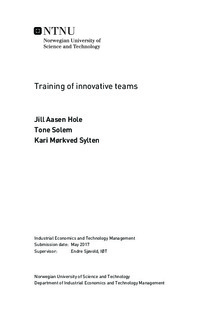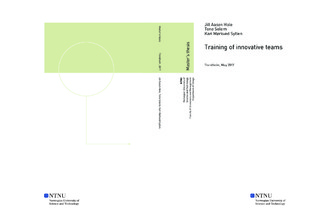| dc.description.abstract | Innovative teams are essential in most organizations, as they are put together to solve complex challenges. It is important that teams are operating as effective as possible to achieve good results. Research has shown that there is not one type of team that is best fitted to operate in all kind of contexts or to solve all types of tasks. Instead, it is the group dynamics, and thus the maturity level of a team that determine how effective a team works. Furthermore, the importance of team building has been emphasized towards making teams more efficient. Still, there has to our knowledge been small efforts towards establishing an integrated training program that focuses on how teams can become better at adapting their maturity level to a task. Accordingly, this master thesis examine this through the research question: How can an innovative team be trained to be aware of and adjust to an appropriate maturity level for a given task?
In order to investigate the research question, a literature review conducted in the fall of 2016, served as the theoretical foundation for the development of a training program. First, several factors with direct influence on a team s maturity level were identified and delimited to shared mental models, psychological safety, trust, and roles and leadership. Additionally, indirect factors affecting the maturity level were found, including team building and context. The training program is built upon these factors, and has been conducted by an innovative team related to the School of Entrepreneurship at NTNU, which was compared to a control group existing of over 30 teams attending the same study program. Data were collected in February and April of 2017, through interviews, SPGR surveys and sociometric badges. Two perspectives have been examined in order to answer the research question: First, the training program s effect on a team s maturity level, and second, if the team s improvement could be tied to the training program. Consequently, the main purpose with this thesis was to investigate if our suggested training program works in practice, and as such contribute to the practical understanding of team building.
The results show that shared mental models are strengthened and psychological safety in the team is improved. Further, the trust level has increased, while the team has a less fixed role structure with more evenly distributed influence after the training. Consequently, the team is able to operate on higher maturity levels. Thus, the thesis conclude that the training program has had measurable effects, making an innovative team more aware of and able to adapt their maturity level to a given task. | |

